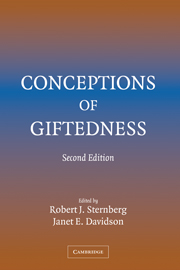Book contents
- Frontmatter
- Contents
- Preface
- List of Contributors
- 1 Gifted Education Without Gifted Children: The Case for No Conception of Giftedness
- 2 Youths Who Reason Exceptionally Well Mathematically and/or Verbally: Using the MVT:D4 Model to Develop Their Talents
- 3 A Child-Responsive Model of Giftedness
- 4 School-Based Conception of Giftedness
- 5 Giftedness, Talent, Expertise, and Creative Achievement
- 6 Permission to Be Gifted: How Conceptions of Giftedness Can Change Lives
- 7 From Gifts to Talents: The DMGT as a Developmental Model
- 8 Nurturing Talent in Gifted Students of Color
- 9 The Munich Model of Giftedness Designed to Identify and Promote Gifted Students
- 10 Systemic Approaches to Giftedness: Contributions of Russian Psychology
- 11 Giftedness and Gifted Education
- 12 The Importance of Contexts in Theories of Giftedness: Learning to Embrace the Messy Joys of Subjectivity
- 13 Feminist Perspectives on Talent Development: A Research-Based Conception of Giftedness in Women
- 14 The Three-Ring Conception of Giftedness: A Developmental Model for Promoting Creative Productivity
- 15 In Defense of a Psychometric Approach to the Definition of Academic Giftedness: A Conservative View from a Die-Hard Liberal
- 16 Creative Giftedness
- 17 Genetics of Giftedness: The Implications of an Emergenic–Epigenetic Model
- 18 The WICS Model of Giftedness
- 19 Beyond Expertise: Conceptions of Giftedness as Great Performance
- 20 Domain-Specific Giftedness: Applications in School and Life
- 21 Extreme Giftedness
- 22 Making Giftedness Productive
- 23 The Actiotope Model of Giftedness
- 24 The Scientific Study of Giftedness
- Author Index
- Subject Index
16 - Creative Giftedness
- Frontmatter
- Contents
- Preface
- List of Contributors
- 1 Gifted Education Without Gifted Children: The Case for No Conception of Giftedness
- 2 Youths Who Reason Exceptionally Well Mathematically and/or Verbally: Using the MVT:D4 Model to Develop Their Talents
- 3 A Child-Responsive Model of Giftedness
- 4 School-Based Conception of Giftedness
- 5 Giftedness, Talent, Expertise, and Creative Achievement
- 6 Permission to Be Gifted: How Conceptions of Giftedness Can Change Lives
- 7 From Gifts to Talents: The DMGT as a Developmental Model
- 8 Nurturing Talent in Gifted Students of Color
- 9 The Munich Model of Giftedness Designed to Identify and Promote Gifted Students
- 10 Systemic Approaches to Giftedness: Contributions of Russian Psychology
- 11 Giftedness and Gifted Education
- 12 The Importance of Contexts in Theories of Giftedness: Learning to Embrace the Messy Joys of Subjectivity
- 13 Feminist Perspectives on Talent Development: A Research-Based Conception of Giftedness in Women
- 14 The Three-Ring Conception of Giftedness: A Developmental Model for Promoting Creative Productivity
- 15 In Defense of a Psychometric Approach to the Definition of Academic Giftedness: A Conservative View from a Die-Hard Liberal
- 16 Creative Giftedness
- 17 Genetics of Giftedness: The Implications of an Emergenic–Epigenetic Model
- 18 The WICS Model of Giftedness
- 19 Beyond Expertise: Conceptions of Giftedness as Great Performance
- 20 Domain-Specific Giftedness: Applications in School and Life
- 21 Extreme Giftedness
- 22 Making Giftedness Productive
- 23 The Actiotope Model of Giftedness
- 24 The Scientific Study of Giftedness
- Author Index
- Subject Index
Summary
An ideal definition of giftedness should be optimally specific and operational. It should be optimal in the sense that it is not too general or too specific. It should not be too general because there are differences between mathematical giftedness and musical giftedness, and further differences between those two and verbal giftedness. There are, in short, clear-cut-domain differences. The mathematical, musical, and verbal domains are just examples; there are numerous others in which an individual can excel. Yet a useful definition of giftedness should be general enough to capture critical commonalities. There must be commonality or else we should probably not refer to these individuals all the same way, as “gifted.” The theory described in this chapter suggests that all expressions of giftedness share the potential for creative work. The gifted child may have domain-specific knowledge and be motivated to invest in only one particular domain; but whichever domain it is, the gifted individual will have the capacity for original work. Creative potential is one of the most critical commonalities among the various domains of giftedness.
The other requirement for the ideal definition – that it is operational – implies that reliable judgments can be made about gifted individuals. It implies that giftedness can be measured, quantified, and predicted. Without this requirement, a definition would be untenable and potentially unfair. One objective of this chapter is to demonstrate how creative giftedness can be operationalized such that it can be reliably assessed.
- Type
- Chapter
- Information
- Conceptions of Giftedness , pp. 295 - 311Publisher: Cambridge University PressPrint publication year: 2005
- 23
- Cited by

